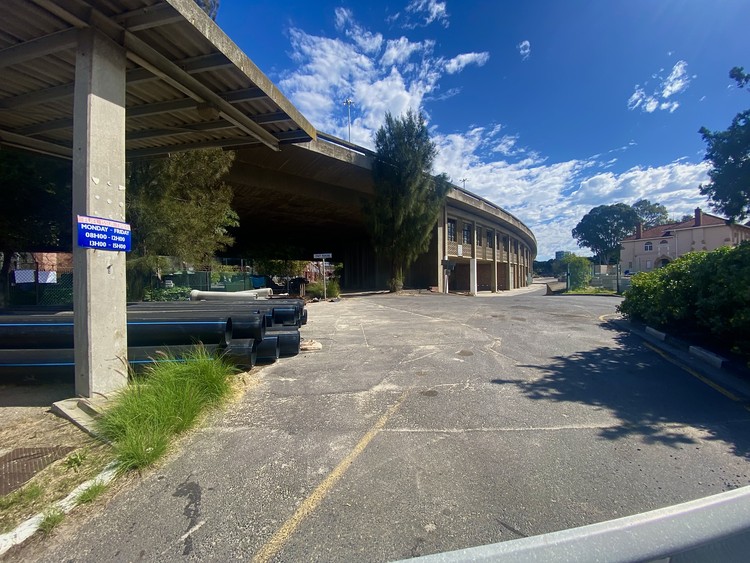
11 April 2023
The City of Cape Town proposed 300-bed Safe Space is located under the fly-over bridge on Ebenezer Road in Green Point. Photos: Matthew Hirsch
The proposed Safe Space for homeless people in Green Point, Cape Town has now been opened for public comment. While the project by the City of Cape Town has largely been welcomed, there are still concerns that the current spaces at shelters in the city will not be enough to deal with the influx of people in need of shelter this winter.
In a recent statement on its Winter Readiness Programme, the City noted that it currently operates two Safe Space facilities at Culemborg in the city centre which offers a total of 480 shelter beds. The new proposed 300-bed Safe Space is located under the fly-over bridge on Ebenezer Road in the Green Point. Public comment for the new facility is open until 8 May.
According to the City, Safe Space capacity is also set to increase in Bellville, Muizenberg and Durbanville in the coming months.
During a site visit to the Culemborg Safe Space last month, Mayor Geordin Hill-Lewis, said the City plans to spend R77-million this year and R230-million over the next three years (a 62% increase) on its Safe Space programme to help homeless people in the city. The Western Cape Department of Social Development has also set aside R33-million of its budget to dedicate to shelters.
Stephen Underwood, of the U-turn Homeless Service Centre, welcomed the City’s expansion of the Safe Space programme. “More shelters are desperately needed in the system. We are looking at over 14,000 people living on the street, and at best we’re probably looking at 3,500 beds. There’s just nowhere near enough [to accommodate everyone].”
Underwood believes there should be more spaces to accommodate homeless people in other parts of the city, not just in the city centre. “We advocate for smaller spaces in more locations. People living on the street have their support network in any given community and that’s where they want to reside. We think that will be a more effective system,” he said.
Underwood said that while the shift in policy was welcome there “is still a punitive angle that the City is taking. We saw that just a few months ago with the eviction application they got [earlier this year].”
The move to get eviction orders for several sites in the city centre has been criticised by housing activists. At the time, Daniellé Louw, an attorney for Ndifuna Ukwazi, said, “The demand for shelter at the moment far outstrips the supply. Whilst we welcome the City and Province investing in further safe spaces, it is unclear where people are expected to stay. It is also very likely that without a developmental plan in place, street-based people will return back to the street in due course.”
The City’s Social Development and Early Childhood Development Department has also availed services to the value of R800,000 for this winter through its Winter Readiness Programme. Qualifying shelters, who are able to temporarily increase their bed capacity, can apply for the aid. This year, shelters providing bed spaces for adult couples, women, and the queer community are also eligible to apply.
The notice at the site, informing the public that they have until 8 May to provide their comments on the proposed site.
Mayco Member for Community Services and Health, Patricia Van der Ross, said, “Historically, our winter readiness programme focused on shelters working with persons living on the street. This year, we are extending an invitation to non-profit organisations offering services to other groups to apply for aid too, provided they meet all of the qualifying criteria.”
Leanne Porter, managing director of New Hope SA in Muizenberg, also welcomed the City’s plans, adding that more shelters are needed in her community. “We are very much in support of more safe spaces. But there needs to be more in the southern suburbs because there is a large community of homeless people and not enough bed spaces in our area.”
She said that people coming to their shelter are offered to participate in work readiness skills training and addiction recovery programmes.
Shaddie Valayadum, CEO of the Haven Night Shelter, said just providing homeless people with a bed and a meal is not enough to help them deal with other issues that may be contributing to their predicament. “They’ll come [into the shelter] in winter and then leave, and you get this revolving door.”
Valayadum spent more than 20 years working with homeless people in Simon’s Town before joining the Haven Night Shelter earlier this year. “We are not exclusive to certain groups. Our main purpose is to get people reintegrated into their communities, reunified with their families and to give them coping skills when they are reintegrated.”
The Winter Readiness Programme will be implemented between 5 May and 31 October 2023. Organisations who meet the criteria and want to apply for aid have until Friday, 14 April to do so.